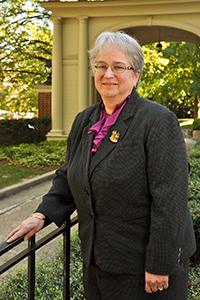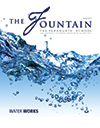Love of Languages Translates into a Career of Service

Fran Hoch
Fran Hoch's love of language started as a child, and has influenced her career choices. When she was in the first grade, she lived in Japan for a year while her father was stationed in the military. She recalls, “That experience opened my eyes to differences in the world and sparked my interest in language. Japanese wasn't an option at my high school, so I took Spanish courses, and my interest in language continued to grow.” She continued this love of language by majoring in Spanish while she attended Muhlenberg College in Pennsylvania.
Still wanting more, Hoch decided to pursue a graduate education in Romance Languages at the University of North Carolina at Chapel Hill. In 1967, Hoch began working on her master's degree and completed a doctorate in 1976. Hoch was inspired to get a graduate degree immediately after finishing her undergraduate work because she saw the difficulties that many women had balancing their family responsibilities with their coursework. She adds, “I saw the burden that women with families had when going back to higher education. I originally only planned to get a master's, but decided to get a PhD after receiving a fellowship. I realized that if I didn't take advantage of the opportunity to pursue a graduate education then, I might never get the chance again.”
She earned her master's degree in 1969, and immediately began working on her doctorate. Hoch finished her PhD coursework in 1970, and then began teaching foreign language courses at Greensboro College. While teaching, she continued to write her dissertation, which she completed in 1976.
Hoch was funded during her graduate education by the National Defense Education Act, a federal program that provided fellowships for graduate students in the fields of math, science and foreign languages. She explains, “There were 50 of these fellowships at the time, which covered all tuition and fees and also included a stipend of $2,000 a year. I didn't have to teach or anything, so the funding enabled me to finish my coursework quickly.”
Her dissertation focus was 20th-century Spanish literature, particularly the work of author Ramón Gómez de la Serna. Although she never used her dissertation in her career, she believes her graduate work affected her professional work greatly. She explains, “I don't feel that my graduate education was wasted because the skills I learned in the PhD program were things that I used all the time in my career, like being able to do research and write quickly. I also learned how to synthesize complicated information into concepts that people could understand. So I don't think that's a waste of time, even though no one asks me about Ramón Gómez de la Serna.”
After completing her degree, Hoch taught at High Point University for seven years. In 1983, she began working for the North Carolina Department of Public Instruction as a foreign language consultant. In this position she was responsible for training teachers in foreign language instruction and working with schools in the entire state. Hoch eventually became a section chief at the organization, where she worked for 24 years.
“I don't feel that my graduate education was wasted because the skills I learned in the PhD program were things that I used all the time in my career.”
“I got to do things professionally at the Department of Public Instruction that I wouldn't have had the opportunity to do if I continued teaching. For instance, I got to see advances in education like elementary foreign language classes,” she says. In fact, in 1987 Hoch helped North Carolina become the first state in the nation to require foreign language classes for every child enrolled in kindergarten through fifth grade.
She details other accomplishments during her tenure at the Department of Public Instruction. “I helped schools and communities in North Carolina adapt to the influx of immigrant students in the school system. I was also involved in a foreign exchange program for teachers at the University of Salamanca in Spain. I got to do a lot of different things in those years, which made for a very exciting professional career.”
Although Hoch retired from the Department of Public Instruction in 2007, she still occasionally works as a consultant for the organization. In her spare time, she volunteers at the North Carolina Museum of History as well as community service groups in the Raleigh area. She also continues to travel to unfamiliar places around the world. She says, “I never lost my desire to travel. In the past year, my husband and I visited Russia and even Antarctica.”
As a member and Chair-elect of the Graduate Education Advancement Board, Hoch says she supports The Graduate School at UNC-Chapel Hill as a way to help other students have the opportunities that a graduate education can offer. She adds, “Professionally, graduate education moves you to another level because it allows you to concentrate on an area of interest and explore it in depth. It allows you to do something that's never been done before and contribute to a body of knowledge. When you start graduate school you think you're on a particular path and you don't necessarily see the bigger picture. But being open to opportunities and not being afraid to do something unfamiliar can lead to all kinds of new possibilities.”
♦ Enelda Butler


